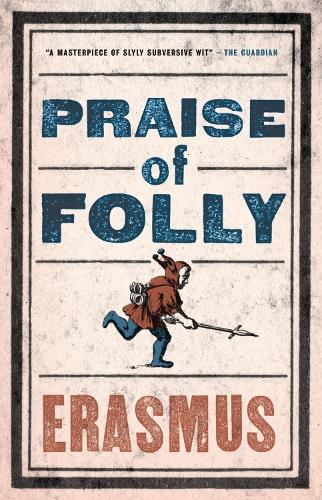
Praise of Folly: Newly Translated and Annotated - Also included Pope Julius Barred from Heaven, Epigram against Pope Julius II and a selection of his Adages
(Paperback)
Available Formats
Publishing Details
Praise of Folly: Newly Translated and Annotated - Also included Pope Julius Barred from Heaven, Epigram against Pope Julius II and a selection of his Adages
By (Author) Desiderius Erasmus
Translated by Roger Clarke
Alma Books Ltd
Alma Classics
12th September 2013
12th September 2013
United Kingdom
Classifications
Physical Properties
Paperback
320
Width 128mm, Height 198mm
340g
Description
The goddess Folly gives a speech, praising herself and explaining how much humanity benefits from her services, from politicians to philosophers, aristocrats, schoolteachers, poets, lawyers, theologians, monarchs and the clergy. At the same time, her discourse provides a satire of Erasmuss world, poking fun at false pedantry and the aberrations of Christianity. Woven throughout her monologue, a thread of irony calls into question the goddesss own words, in which ambiguities, allusions and interpretations collide in a way that makes Praise of Folly enduringly fascinating.
Reviews
Erasmus searched for reconciliation between Faith and Reason, refusing not only the dogmas of Faith, but the dogmas of Reason as well. -- Carlos Fuentes
Praise of Folly, still a masterpiece of slyly subversive wit, was in a sense the first best-seller, read covertly under desks and sniggered over by countless trainee monks and priests. -- Nicholas Lezard * The Guardian *
I am well aware that what I have had to say on the problem of peace is not essentially new. It is my profound conviction that the solution lies in our rejecting war for an ethical reason; namely, that war makes us guilty of the crime of inhumanity. Erasmus of Rotterdam and several others after him have already proclaimed this as the truth around which we should rally. -- Albert Schweitzer in his 1952 Nobel Peace Prize lecture
From the terrible hate storm of his age Erasmus has salvaged this intellectual gem, his faith in humanity, and on this small burning wick Spinoza, Lessing and Voltaire and all Europeans past and present could light their torch. -- Stefan Zweig
Author Bio
Desiderius Erasmus (1469-1536) devoted his life to the study of theology and the defence of Christian ideals. He rose to a prominent position in the Church, and achieved fame for his writings. He played an important part in history by fostering the intellectual climate for the Reformation, and many of his ideas have a legacy which endures to the present day.
